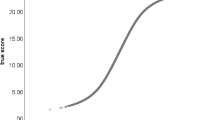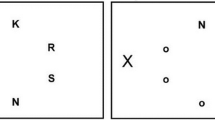Abstract
We consider tasks where in order to perform them it is sufficient that one member of a group will know how to do it. We are interested in the effect of task difficulty, and variability of that difficulty, on group performance, and in particular on the marginal contribution of an additional number to the performance of groups of different size. We explore the implications of various stochastic orders over task difficulty and variability. Some intuitive conjectures are shown to be false.
Similar content being viewed by others
References
Chow, Y.S. and Teicher, H., Probability Theory: independence, interchangeability, martingales, 2nd ed., New York, Springer-Verlag, 1988.
Gordon, M. and P. Pathak, “Finding information on the World Wide Web: the retrieval effectiveness of search engines”, Information Processing and Management, Vol. 35, pp141–180, 1999.
Karlin, S., Total Positivity, Vol. 1, Stanford University Press, Stanford, CA, 1968.
Polya, G. and G. Szego, Problems and Theorems in Analysis, Vol. II, Berlin and New York, Springer-Verlag, 1976.
Ross, S., Stochastic Processes, New York, Wiley, 1983.
Shaked, M. and Shanthikumar, J.G., Stochastic Orders and Their Applications, New York, Academic Press, 1994.
Stoyan, D., Comparison Methods for Queues and Other Stochastic Models, New York, Wiley, 1983.
Author information
Authors and Affiliations
Additional information
The second author would like to thank NSERC, K-C Wang Foundation, and Hong Kong University of Science and Technology for their financial supports to this research.
Yigal Gerchak is a Professor and Head of the department of Industrial Engineering at Tel-Aviv University. Prior to that he spent many years at the University of Waterloo, Canada. His main current research interests are coordination in decentralized supply chains, risk-pooling and final offer arbitration. He is a Department Editor of IIE Transactions.
Qi-Ming He is an associate professor in the Industrial Engineering Department of Dalhousie University. His main research areas are algorithmic methods in applied probability, queueing theory and inventory management. Recently, he is working on queueing systems with multiple types of customers and inventory systems with multiple types of demands.
Rights and permissions
About this article
Cite this article
Gerchak, Y., He, QM. Group size and parallelism effects in tasks with heterogeneous levels of difficulty: A stochastic order approach. J. Syst. Sci. Syst. Eng. 13, 36–44 (2004). https://doi.org/10.1007/s11518-006-0152-4
Issue Date:
DOI: https://doi.org/10.1007/s11518-006-0152-4




